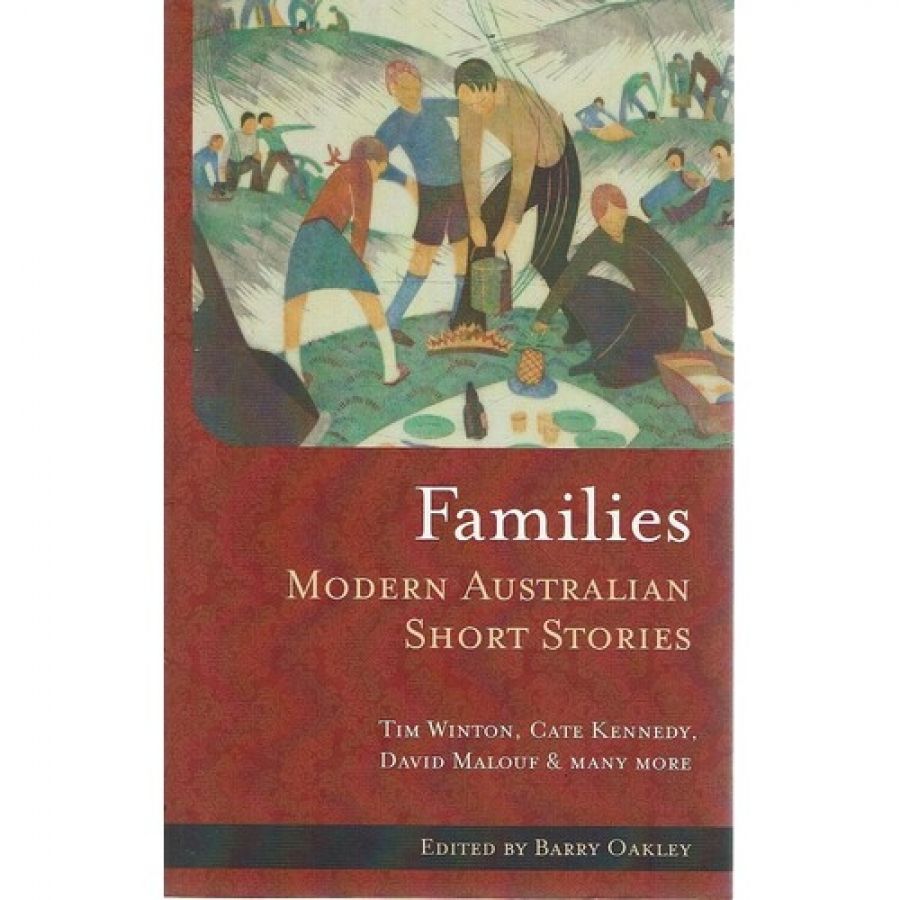
- Free Article: No
- Contents Category: Short Stories
- Review Article: Yes
- Article Title: A rather broad filter
- Online Only: No
- Custom Highlight Text:
Barry Oakley, in his brief introduction to Families: Modern Australian Short Stories, tells us that the quality he was seeking in the fiction was ‘vitality’. This seems a rather broad filter: surely all good writing must possess vitality if it is going to hold the reader’s attention? Notwithstanding, many of the stories here are good, even excellent.
- Book 1 Title: Families
- Book 1 Subtitle: Modern Australian short stories
- Book 1 Biblio: Five Mile Press, $24.95 pb, 320 pp
- Book 1 Cover Small (400 x 600):

- Book 1 Cover (800 x 1200):

Laurie Clancy’s ‘Loyalties’, about a small boy trying to be even-handed with his separated parents, has real poignancy and truthfulness in its depiction of what divorce can do to children, while Janette Turner Hospital’s ‘After Long Absence’ is finely realised and profoundly moving. It powerfully evokes the pain the adult child feels in her alienation from her parents, whom she loves, because of their extreme religious beliefs. A successful and cosmopolitan woman, the narrator believes that her parents’ unbending convictions have distorted their relationship, but she is led to realise that they can be more generous about her difference than she can be about theirs. Being familiar with Brian Matthews’s memoir A Fine and Private Place (2000), I enjoyed the pleasure of recognition in the extract ‘Not One of Your Prime Sites’, a depiction of his working-class childhood home in St Kilda, in the late 1940s. Lily Brett’s story ‘A Family Portrait’ shimmers with bitterness about an immaculately groomed mother whose obsession with perfection in all the feminine arts consigns the rest of the family to the margins and into secret lives of their own.
Paddy O’Reilly’s ‘Stick Figures’ is a chilling and spare child’s view of a narcissistic and desperate single mother. It leaves one feeling both distaste and compassion for the mother and pity for the child who observes her frantic, attention-seeking and her malicious games with men. Lee Kofman’s ‘Floating above the Village’, about her difficult Orthodox Jewish mother’s visit from Israel to her own casual (non-kosher) home in Melbourne is funny and moving. The mother is completely indifferent to the sights of the city her daughter shows her until, unexpectedly, she has an epiphanic moment of bonding with a kangaroo at the Healesville Sanctuary. I also liked Marshall Browne’s ‘Mountain Greenery’, about an upright, ex-military father, now retired, disappointed in his ne’er-do-well son, who finds himself under police investigation for the cultivation of marijuana on his bush block. The father’s struggle to avoid the knowledge that his son is responsible for this is painful to read. Despite the past breakdown in his relationship with the boy’s mother, the father’s commitment to helping his delinquent son has been unflagging over the years, but is now finally swept away by this last unforgivable transgression.
Space prevents me from commenting on all the stories. One favourite was ‘Velvet’, by Julie Gittus. The first-person narrator is a young woman who visits a farm on the city’s outskirts at the invitation of an older man whom she has recently met, unaware that his motive is sexual. On arrival, she discovers an odd ménage à trois is already in play and that she is expected to become part of this arrangement. What makes the story work so well is the inner narrative. In the midst of her uncertainty and embarrassment about the situation in which she finds herself is her abject awareness that she is bleeding through her jeans. She can’t find the toilet and when she does she realises that she has left her tampons behind in her handbag and has to improvise with a wad of toilet paper. This story succeeds in its wit and lightness of touch.
A comment about the formal arrangement of the anthology is needed. It is rigidly set out under the overarching rubric, ‘Families’. The stories are then ordered accord- ing to nine sub-themes: Mothering, Fathering, Parenting, Sibling, Bonding, Discovery, Refusing, Battling, Breaking and Spooking. Occasionally, this categorisation seemed strained and prescriptive. But there is a satisfying range of contributors; of the twenty-five stories, there are nine women and fifteen men. Well-known writers and some new talent are included which lends both freshness and solidity. The book itself is attractive and has an appealing cover with a reproduction of a linocut by Ethel Bower, entitled ‘Bank Holiday.’ There are useful biographical notes about the contributing writers at the back. This is a pleasing col- lection and would make a helpful teaching text.


Comments powered by CComment